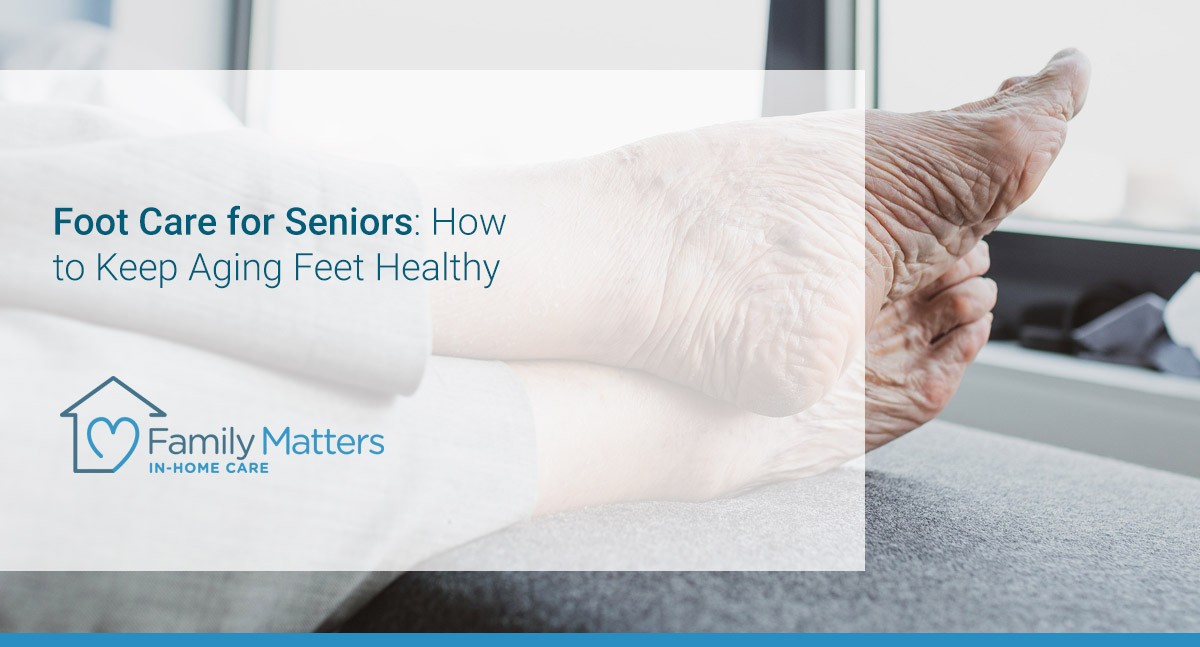
Foot Care for Seniors: How to Keep Aging Feet Healthy
Did you know that by age 50 the average adult has walked 75,000 miles? And with life expectancy going up each year, that is many more miles that we should expect to walk.
No foot pain is “normal,” even as we age. Many of our older loved ones may chalk up foot pain to the aging process and ignore it. Worse yet, they often cut back on activities to try to prevent pain, causing other health risks. Our feet often provide early indications of conditions such as diabetes, arthritis, or circulatory disease. All pain should be referred to a podiatrist for diagnosis and treatment.
According to the US National Center for Health Statistics, impairment of the lower extremities is a leading cause of activity limitation in older people. The NCHS also reports that one-fourth of all nursing home patients cannot walk at all, while another one-sixth can walk only with assistance. Poor foot care can contribute to these statistics. However, there are solutions.
The most important solution is daily foot care.
Often, care beyond the daily bath or shower is difficult for older adults due to challenges bending down or seeing their feet, so it’s important that we help out weekly, if not daily.
Some things to pay attention to for foot care in the elderly include:
- Toenail length. Toenails should be trimmed straight across and kept short enough so they do not press on neighboring toes.
- Blisters, cuts or scratches. These can lead to infection if ignored. Thinner, aging skin can make it easier to bump or bruise our feet, allowing for the entry of bacteria.
- Dryness. Cracks in the toes or heels can also allow bacteria to enter. Moisturize regularly with a moisturizer made specifically for feet.
- Callouses or corns. These are often signs that perhaps shoes are not the right fit.
- New moles or discolorations. Check for any new moles or discolorations, including between the toes and on the bottom of the feet. Immediately bring these to a dermatologist’s attention
- Swelling. Many health risks, including diabetes, injury to the leg, or circulatory issues, will show up as swelling in the feet.
- Sensitivity or lack of sensitivity. Either one of these can signal nerve damage and should be investigated right away
Choosing a Podiatrist
Feet are complex anatomical structures that require expert care. Be sure your loved one is seeing the most qualified healthcare professional to treat their feet by looking for “DPM” (Doctor of Podiatric Medicine) after his or her name. This means a physician has completed years of rigorous foot and ankle training in podiatric medical school and hospital-based residency training, making him or her uniquely qualified to care for this part of the body.
Characteristics of a Properly Fitted Shoe
Time for new shoes? A properly fitted shoe should have the following characteristics:
- At least one inch (a thumb’s width) between the end of the shoe and the longest toe
- Room to pinch some material at the sides or top of the shoe for width
- A shape that matches the shape of and conforms to the foot (No human has a foot shaped like the point that many dress shoes have. Flip flops and unsupported sandals can lead to falls.)
- A firm heel area (Press on both sides of the heel area to ensure that the heel is stiff and won’t collapse.)
- A flexible shoe box to allow for a natural heel to toe walking pattern
- A firm sole (Try to twist the shoe from side to side. It shouldn’t twist in the middle.)
A shoe with a firm sole and soft upper that can be laced, buckled, or strapped to the foot is best for daily activities. Measure both feet late in the day and buy the shoe that fits the larger foot. If your podiatrist has prescribed orthotics, take them with you and try them out in the shoes you’re considering.
If you or your family member is considering in-home care as part of a plan to age in place, contact Family Matters In-Home Care today for a free consultation. Our team is dedicated to supporting your family and helping older adults enjoy life in the comfort of their own home for as long as possible.
Some of the services offered by Family Matter In-Home Care include: Alzheimer’s & Dementia Care, Bed & Wheelchair Transfer Assistance, Companionship, Housekeeping & Meal Preparation, Personal Care, Recovery Care, and Transportation.
Serving the San Francisco Bay Area and Greater San Diego, Family Matter In-Home Care has offices throughout California including: Campbell, CA, Roseville, CA, San Marcos, CA, and San Mateo, CA.
Sources:
- https://f.hubspotusercontent30.net/hubfs/1708580/Marketing%20Monthlies/PDFs/0221-FootHealth.pdf
- https://www.apma.org/Patients/FootHealthList.cfm?navItemNumber=25223
- https://www.podiatry.org.au/foot-health-resources/ageing-feet-2
- https://www.apma.org/Patients/HealthyFeetTips.cfm?ItemNumber=10050
- https://www.afacc.net/foot-problems/treatment/geriatric-foot-care/
- https://www.hrsa.gov/sites/default/files/hansensdisease/leap/footcareforalifetime.pdf
